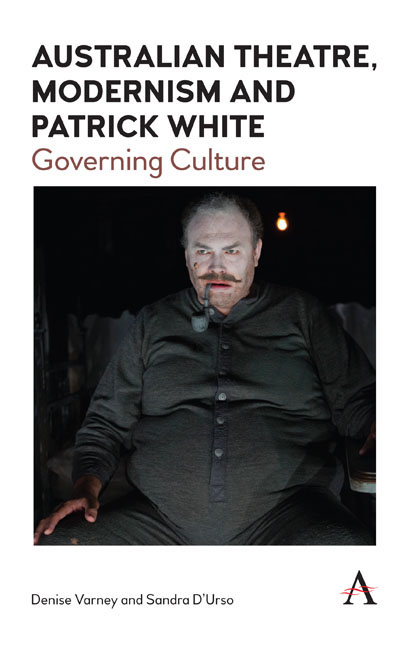Book contents
- Frontmatter
- Contents
- List of Illustrations
- Acknowledgements
- Introduction
- 1 The Archive, Governance and Sovereignty
- 2 ‘Words Fail Me’: The Ham Funeral and the 1962 Adelaide Festival
- 3 Night on Bald Mountain and the 1964 Adelaide Festival
- 4 The ‘Clowns’ Who ‘Cling to the Past’: A Sovereign Decision and the Practice of Exclusion
- 5 The Sovereignty of the Plays and Opportunities for New Publics
- Index
1 - The Archive, Governance and Sovereignty
Published online by Cambridge University Press: 29 May 2019
- Frontmatter
- Contents
- List of Illustrations
- Acknowledgements
- Introduction
- 1 The Archive, Governance and Sovereignty
- 2 ‘Words Fail Me’: The Ham Funeral and the 1962 Adelaide Festival
- 3 Night on Bald Mountain and the 1964 Adelaide Festival
- 4 The ‘Clowns’ Who ‘Cling to the Past’: A Sovereign Decision and the Practice of Exclusion
- 5 The Sovereignty of the Plays and Opportunities for New Publics
- Index
Summary
The rejections of The Ham Funeral and Night on Bald Mountain by the Adelaide Festival's Board of Governors were not random events but were linked to structures of governance and a presumption of sovereignty. Although the Board was not a statutory or corporate body, the Adelaide Festival's Board of Governors and committees held regular meetings and kept formal and, at times, extensive minutes. Members of the Board and committees and Festival staff communicated to the outside world through written correspondence, press releases and Festival advertising and programs. This archive allows us to reconstruct key events in Australian cultural history and address the critical questions they raise about the confrontation of a colonial culture with the emergent dynamic of modernism in the post-war period.
The Archives
To sit in the quiet of the reading rooms at the National Library of Australia, the State Library of South Australia and Barr Smith Library at the University of Adelaide is to enter the archive. The documents we seek, scan, decipher and read cover only a short period from 1959 to 1964, and while we hone in on the details of dates, names and decision making with regards to the rejection of the two plays by Patrick White, we read for broader patterns, trends and styles of governance. We are aware of hierarchies of power and authority in the language of the last century and of boards and committees made up exclusively of white, wealthy, older, socially well connected men, of the kind who are, in Ralph Waldo Emerson's famous words, born to rule. The minutes of meetings, correspondence and newspaper columns – while allowing for the inevitable gaps in the recorded information – lead us to the view that the Board of Governors took a censorious stance not just towards White but also to Australian drama more broadly. At its second meeting on 5 May 1959, the newly formed Board reported that ‘arrangements are in hand to select a new Australian Play’, but noted that if one was not available, then ‘an overseas play by a modern author not previously performed in Australia’ would be acceptable. This arrangement played into the ‘cultural cringe’, which the critic A. A. Phillips described in the 1950s as ‘the assumption that the domestic cultural product will be worse than the imported article’.
- Type
- Chapter
- Information
- Australian Theatre, Modernism and Patrick WhiteGoverning Culture, pp. 17 - 30Publisher: Anthem PressPrint publication year: 2018

